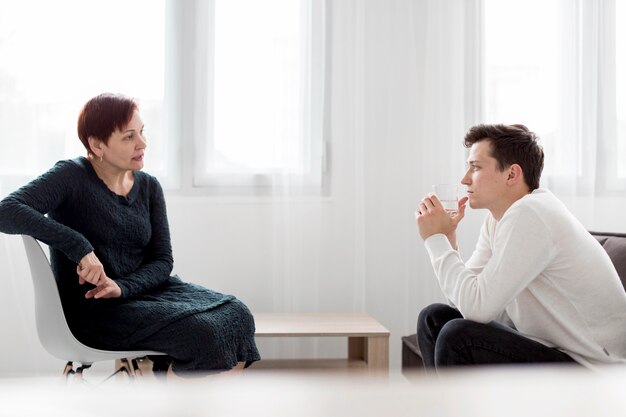Choosing a detox center that aligns with your identity and needs is crucial for a successful recovery journey. For LGBTQ+ individuals, finding a detox center that provides a supportive and affirming environment can significantly impact their treatment experience and outcomes. All American Detox is dedicated to offering a safe, inclusive, and specialized detox service tailored to the unique needs of the LGBTQ+ community in Los Angeles, CA. This guide explores what makes a detox center LGBTQ+ friendly and the benefits of selecting a center with specialized expertise in LGBTQ+ care.
What Makes a Detox Center LGBTQ+ Friendly?
An LGBTQ+ friendly detox center is one that actively creates an inclusive and supportive environment for individuals of all gender identities and sexual orientations. This involves more than just non-discrimination policies; it requires a deep commitment to understanding and addressing the specific challenges faced by LGBTQ+ individuals during detox and recovery. A truly LGBTQ+ friendly center will ensure that all staff are trained in LGBTQ+ issues and that the facility promotes respect and acceptance at every level.
Such centers often integrate inclusive practices into their everyday operations, including having gender-neutral facilities, using affirming language, and providing resources that reflect the diversity of the LGBTQ+ community. These efforts help create a space where individuals can focus on their recovery without fear of judgment or discrimination.
Importance of Inclusive and Affirming Detox Services
Inclusive and affirming detox services are essential for fostering a supportive environment where LGBTQ+ individuals feel safe and respected. The process of detox can be challenging and emotionally taxing, and feeling accepted and valued can greatly enhance an individual’s willingness to engage in the treatment process. An inclusive approach ensures that clients are not only treated with dignity but also receive care that is sensitive to their unique experiences and needs.
Affirming detox services also address the mental health aspects associated with substance use. LGBTQ+ individuals often face additional stressors such as stigma, discrimination, and internalized homophobia, which can contribute to substance use. Providing a supportive environment that acknowledges and addresses these factors is crucial for effective treatment and long-term recovery.
Benefits of Choosing an LGBTQ+ Specialized Detox Center
Opting for an LGBTQ+ specialized detox center offers several distinct benefits. These centers are equipped to address the specific needs and experiences of LGBTQ+ individuals, ensuring that treatment is both relevant and effective. Specialized centers often provide targeted support for issues such as minority stress, identity-related challenges, and the impact of societal stigma on mental health.
Additionally, LGBTQ+ specialized centers often offer a more welcoming atmosphere where clients can interact with peers who share similar experiences, which can enhance the sense of community and support during recovery. This specialized approach helps build trust between clients and healthcare providers, improving overall treatment outcomes.
Understanding the Unique Needs of LGBTQ+ Individuals in Detox
LGBTQ+ individuals may have unique needs during detox that differ from those of their heterosexual and cisgender counterparts. These needs can include dealing with issues related to gender dysphoria, discrimination, and the impact of previous trauma. A detox center that understands these unique challenges is better equipped to provide comprehensive care that addresses both the physical and emotional aspects of detox.
Recognizing and validating these needs is crucial for creating an effective treatment plan. LGBTQ+ individuals may benefit from therapies and support services that specifically address the stressors and experiences that contribute to substance use and recovery challenges.
Key Features of LGBTQ+ Friendly Detox Centers
LGBTQ+ friendly detox centers often feature several key attributes that set them apart. These may include:
- Inclusive Policies and Practices: Centers that have clear non-discrimination policies and practices to ensure all clients are treated with respect and dignity.
- Affirming Environment: Facilities that provide gender-neutral restrooms and other inclusive amenities.
- LGBTQ+ Competent Staff: Healthcare professionals who are trained in LGBTQ+ issues and who approach care with cultural competence and sensitivity.
These features contribute to a positive and supportive treatment environment where clients can feel comfortable and understood throughout their detox journey.

Support Services Offered: Counseling and Therapy
Effective detoxification involves more than just managing physical withdrawal symptoms; it also requires addressing the emotional and psychological aspects of recovery. LGBTQ+ friendly detox centers offer specialized counseling and therapy services designed to support clients through this process.
These services may include individual therapy, group counseling, and family therapy, all tailored to address the unique challenges faced by LGBTQ+ individuals. Therapists with expertise in LGBTQ+ issues can provide support that acknowledges and addresses the specific experiences and stressors related to identity and recovery.
Safe and Affirming Environment for All Gender Identities
Creating a safe and affirming environment is a cornerstone of LGBTQ+ friendly detox centers. This involves ensuring that all gender identities are respected and that clients have access to facilities and services that reflect their identity. For example, providing gender-neutral bathrooms and respecting clients’ preferred pronouns are essential practices for fostering an inclusive atmosphere.
An affirming environment helps clients feel valued and understood, which can significantly enhance their comfort and willingness to engage in the treatment process. It also reduces the risk of experiencing discrimination or bias during their recovery journey.
Healthcare Professionals Trained in LGBTQ+ Issues
Healthcare professionals at LGBTQ+ friendly detox centers are typically trained to understand and address the specific needs of LGBTQ+ clients. This training includes knowledge of relevant medical and psychological issues, as well as sensitivity to the unique challenges faced by LGBTQ+ individuals.
Trained professionals can offer more effective care by recognizing and addressing issues such as minority stress, internalized stigma, and trauma. Their expertise helps ensure that treatment is both appropriate and effective for clients of diverse sexual orientations and gender identities.
Cultural Competence and Sensitivity in Care
Cultural competence and sensitivity are critical components of effective care in LGBTQ+ detox centers. This involves understanding and respecting the diverse backgrounds and experiences of clients, including their cultural, sexual, and gender identities.
Healthcare providers who demonstrate cultural competence are better equipped to deliver personalized care that acknowledges and addresses the unique needs of each client. This approach not only improves the quality of care but also fosters a trusting and supportive therapeutic relationship.
Finding the Right LGBTQ+ Detox Center in Los Angeles
Finding the right LGBTQ+ detox center involves considering several factors to ensure that the facility meets your needs. Look for centers with a proven track record of providing inclusive and affirming care, and seek out those with specialized programs and trained staff.
Researching and visiting potential centers can help you assess their environment, services, and approach to care. It’s important to choose a facility where you feel comfortable and supported, as this can significantly impact your overall recovery experience.
LGBTQ+ Friendly Detox Centers: Effective Recovery
Choosing an LGBTQ+ friendly detox center is a crucial step in ensuring that your recovery journey is supported by an environment that is both inclusive and affirming. All American Detox is committed to providing high-quality, specialized detox services that address the unique needs of the LGBTQ+ community. By selecting a detox center that understands and respects your identity, you can embark on your path to recovery with the confidence and support you deserve. For more information or to find out how we can assist you, contact us today.
FAQs
-
What is an LGBTQ+ friendly detox center in Los Angeles, CA? An LGBTQ+ friendly detox center in Los Angeles, CA provides a safe and supportive environment for individuals from the LGBTQ+ community to undergo the detoxification process, free from judgment and discrimination.
-
Why is it important to choose an LGBTQ+ friendly detox center? Choosing an LGBTQ+ friendly detox center in Los Angeles, CA ensures access to culturally competent care, understanding staff, and a supportive community, which are crucial for a successful recovery journey.
-
What specific services should an LGBTQ+ friendly detox center offer in Los Angeles, CA? An LGBTQ+ friendly detox center in Los Angeles, CA should offer medical detox, mental health support, and education on LGBTQ+ issues alongside substance abuse treatment.
-
How can I find an LGBTQ+ friendly detox center in Los Angeles, CA? To find an LGBTQ+ friendly detox center in Los Angeles, CA, research facilities, seek recommendations from LGBTQ+ organizations, and look for centers that prioritize inclusivity and diversity.
-
What factors should I consider when choosing an LGBTQ+ friendly detox center? When selecting an LGBTQ+ friendly detox center in Los Angeles, CA, consider factors such as staff training, treatment programs, amenities, cost, and insurance acceptance.
-
What kind of support groups are available for LGBTQ+ individuals in recovery in Los Angeles, CA? Many LGBTQ+ friendly detox centers in Los Angeles, CA offer support groups specifically for the LGBTQ+ community, providing a safe space to connect with peers and share experiences.
-
How can I address concerns about discrimination or prejudice during detox? If you experience discrimination or prejudice at an LGBTQ+ friendly detox center in Los Angeles, CA, address your concerns with the facility’s administration or seek support from LGBTQ+ advocacy organizations.
-
What is the role of mental health care in LGBTQ+ addiction recovery? Mental health care is crucial for LGBTQ+ individuals in recovery, as many face unique challenges such as depression, anxiety, and trauma. A comprehensive detox program should address both substance abuse and mental health.
-
How can I find LGBTQ+ resources and support after detox in Los Angeles, CA? There are numerous LGBTQ+ resources and support groups available in Los Angeles, CA to assist with ongoing recovery. Connect with community organizations and healthcare providers for guidance.
-
What is the importance of cultural sensitivity in LGBTQ+ addiction treatment? Cultural sensitivity is essential in LGBTQ+ addiction treatment as it creates a welcoming and inclusive environment, fostering trust and promoting open communication between patients and providers.



